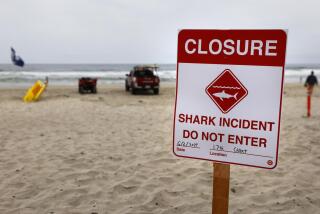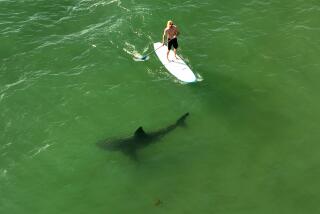Australia’s plan for shark attacks? Attack the sharks
Got Jaws? There’s been an uptick in fatal shark attacks off Western Australia in the last year. The reasons are unclear, but the government thinks it has a solution: Kill any shark that swims close to the beach, including great whites, which the government usually protects as an endangered species.
Conservationists are protesting; unfortunately, the numbers they use as an argument against the idea aren’t very convincing. Yes, it’s true, as the Sea Shepherd Conservation Society points out, that in all of Australia, sharks have killed 18 people in the last 215 years. That’s one death every 12 years or so. But that might be a little too expansive a look for the situation confronting Western Australia right now: Five surfers have been killed by sharks in the last year.
Obviously, the government should take moves to protect people, and it must put in place effective safety measures. The big question in my mind is the word “effective.” Unless and until authorities understand how the sharks move, when they’re liable to attack and what’s causing the increase in fatal attacks in the first place, this policy seems like a way to do a lot of damage without helpful results. Are sharks hanging out near the beach in search of a human meal, the way a tiger can become a man-eater? Or are they constantly swimming in and out of those close-to-shore waters -- sharks can cover more than 30 miles of territory in a day -- doing no harm as they slip past swimmers?
Some experts theorize that the increase in shark numbers is linked to a rise in the number of seals and whales in the area. In that case, shark populations probably are going to continue following the seals, and killing sharks that the government happens to find near swimmers won’t help much. Others say the significant population increase has been in the number of people in the water.
The anti-shark-attack plan includes some more helpful elements: more jet skis for lifeguards, a tracking program and study of the sharks’ movements as well as shark enclosures at the beaches.
I’m not a shark hugger, but the smarter move would probably be to implement those aspects of the program first and see what comes of it. Killing without any real knowledge of whether that will accomplish anything sounds like a way to make beachgoers feel safe without actually protecting them.
ALSO:
What would a married Jesus say?
Biden passes his ‘Obamacare’ quiz
Carmageddon’s untold benefits, and how to keep them
More to Read
A cure for the common opinion
Get thought-provoking perspectives with our weekly newsletter.
You may occasionally receive promotional content from the Los Angeles Times.











